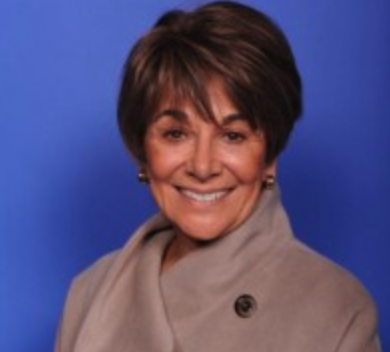With expertise in both the public and private sectors, Representative Susan Brooks (R-Ind.) serves the public by promoting economic development, public safety, and homeland security in Congress. Recognizing the importance of technology and its role among these issues, Representative Brooks sponsored a law that reformed the Social Media Working Group in the Department of Homeland Security. The group brings experts from academia and the private sector together to improve social media techniques during emergencies for the benefit of American citizens. She is also a passionate advocate for computer science competency.
Representative Brooks serves on the House Energy and Commerce Committee where she sits on the Commerce, Manufacturing and Trade, Health, and Oversight and Investigations Subcommittees. In addition, she regularly works to bring more women into the tech field. She serves as co-chair of the Women’s High-Tech Coalition, and is a member of the Makers Caucus and the STEAM (science, technology, engineering, arts, and math) Caucus.
Before Congress, she was the senior vice president and general counsel for Ivy Tech Community College. She also served as U.S. attorney for the Southern District of Indiana and as the deputy mayor of Indianapolis.
As part of our Beltway Voices series, we caught up with Representative Brooks to discuss a variety of issues important to developers.
Application Developers Alliance: It was recently announced that negotiators have agreed, at least in principle, to the EU-US Privacy Shield, which would replace the invalidated Safe Harbor Agreement. How important is the quick passage of this legal framework to American businesses here and abroad? What would you stress to the negotiators on both sides as they finalize the details?
Representative Susan Brooks (R-Ind.)
Representative Brooks: In late 2013, I had the ability to travel to Brussels to speak with European policy leaders. One of the topics of discussion was Safe Harbor. In our meetings, I highlighted the success of Safe Harbor in maintaining strong personal privacy protections for European citizens, and stressed the weakening effect of eliminating Safe Harbor on privacy protections.
My home state of Indiana has a large contingent of pharmaceutical and medical device companies who depend on Safe Harbor to transfer their data across international boundaries, harnessing “big data” to improve the healthcare of people around the globe. Hoosier companies use cloud based software where users can share medical images with other departments and centers in countries around the world to improve product design, allow for nearly instantaneous interpretation and diagnosis of medical records, or compile records for clinical studies. Utilization of cross-border data also enables life science companies to use bigger, more-complete data sets in clinical trials that can lead to faster development of new treatments, more reliable diagnoses, and better healthcare.
To ensure that companies in Indiana can continue their innovative research without the threat of increased liability exposure, we must move forward to reinsert certainty and confidence in cross border data flows that will improve the competitiveness of the countries implementing these policies and strengthen the global economy. Continued regulatory uncertainty will only block economic growth and development for businesses and entrepreneurs.
Application Developers Alliance: Developers are coming up with new life-changing products by the day, in large part because they are able to collect, store, and study data. Citing privacy concerns, some policymakers in Washington and in the states are working to clamp down on what data gets collected and how long it can be stored. Developers respect the data they collect and understand the security and privacy risks. Indeed, they fully comprehend how critical good data stewardship is to consumer trust and business growth. What are your thoughts on data collection and retention?
Representative Brooks: Last year, the Energy and Commerce Committee passed the Data Security Breach Notification Act out of committee. The bill established a uniform federal standard for entities that collect and maintain personal information of individuals to secure that information and provide notice to the individual should a breach of security occur. Previously, entities were required to comply with regulations and standards set by individual states.
As conversations with industry stakeholders, consumers and the Federal government continue, I believe that all parties can find common ground to protect consumer privacy and ensure that sensitive personal data is protected.
Application Developers Alliance: Consumers rightly demand the data they entrust to companies and developers remain secure. As a result, end-to-end encryption is quickly becoming the industry norm. Some in the law enforcement community say this practice is harming criminal investigations and are now calling for special access to technologies — whether it be via a built-in backdoor or decryption. Given your expertise in both technology and law enforcement, what are your views on the encryption debate?
Representative Brooks: Data encryption is an increasingly common feature of smartphones and other electronic devices that protects consumer data against unwanted access. The encryption debate, as highlighted by the current Apple lawsuit, is an increasingly contentious issue. While technology companies favor data encryption as a way to better guarantee their customers’ privacy, the Federal Bureau of Investigation (FBI) and other law enforcement entities argue that data encryption safeguards criminals from lawful searches and hampers counterterrorism efforts.
In Congress, I will work to ensure that our law enforcement community has access to the technological tools needed to keep our communities safe, while safeguarding Americans’ privacy and civil liberties. I encourage technology developers to work with the law enforcement community to create solutions that further investigations without compromising the privacy of citizens and the products and services of the technology community. These are important discussions that the government, law enforcement community and technology developers must engage in together.
Application Developers Alliance: In your home state of Indiana, you have worked repeatedly to foster the growth of the tech workforce, most notably as senior vice president and general counsel of Ivy Tech Community College. Your efforts enhanced job training and placement for thousands of Indiana’s residents. In Congress, you have sponsored legislation to support computer science education here in the U.S. How would you rate STEM (science, technology, engineering, and math) education efforts in the U.S. and how can lawmakers in Washington improve in these areas?
Representative Brooks: We need to start computer science education earlier in our nation’s classrooms. In today’s knowledge-based economy, it is more important than ever to ensure our education system aligns with the demands of the 21st century workforce. However, there is a mismatch between the jobs of the future and the skills we are providing our nation’s young people. One of the places we haven’t kept up is in computing and computer science.
Last Congress, I introduced H.R. 2536, the Computer Science Education Act, which called for computer science to be included as a “core academic subject,” and which gained broad bipartisan support from 120 cosponsors. Computer science education advances technology skills, reinforces lessons of reason, logic, and mathematics, and builds problem solving ability in our kids.
I was pleased to see that the Elementary and Secondary Education Act Reauthorization, S. 1177, the Every Student Succeeds Act, this year included provisions to support and enhance computer science education in our nation’s schools. While the new bill removed defined core academic subjects, it created a new definition of well-rounded education subjects, which includes computer science as well as engineering and math (STEM), and technology, among others.
Including computer science as a component of a well-rounded education in this important legislation helps state and local policymakers make more informed choices about how to spend federal dollars to provide the best education to our children and set them up to succeed in the careers of the future. Not only does this legislation include computer science and STEM education as integral components of a well-rounded education, it supports and encourages teachers and school leaders to continue their own professional development and education in these fields, ensuring that our educators are keeping up with cutting edge technology and developments in these fast-growing industries.
I firmly believe that we must continue to build this momentum to both empower and equip local and state administrators to put computer science curriculum and teachers in our schools and to prepare our students to enter the 21st century workforce.
Application Developers Alliance: In your role as co-chair of the Women’s High-Tech Coalition, you are a beacon for young girls everywhere who are looking to break into senior levels of the tech sector. What can more women
in senior levels offer to the industry? What should be done to further support women in this field?
Representative Brooks: Last year, fewer than 38,000 of the 4 million Advanced Placement (AP) exams administered were the AP Computer Science exam. We need to do a better job of interesting all students in computer science and STEM careers. Further, there is a disturbing gender disparity in computer science education. Only 20% of AP Computer Science exams are taken by young women.
The lack of women interested in the AP computer science exam and at the top of STEM and computer science careers is not unique. In many fields and professions, women are underrepresented, including politics. We need more women in leadership everywhere because inclusive leadership teams drive better results and make better decisions, regardless of industry. I’m actually participating on a panel on this very topic at South by Southwest.
In addition to supporting computer science and STEM education programs to ensure that the next generation is ready to take on careers in these growing fields, we need to show young women especially that they can lead in this industry. Research indicates that girls might not be choosing to pursue STEM fields because of the absence of positive role models. Young women and girls need to see women leading tech companies, building cutting edge technology, writing code, and developing innovative solutions. Mentorship of young women and girls by women already pursuing careers in STEM and computer science is critical, both in classroom and workplace settings.
The Bureau of Labor Statistics predicts that in the year 2022, there will be 9.9 million jobs in the STEM fields. Of those jobs, half will be in computing and information technology. That’s 4.9 million jobs waiting for those who choose to study computer science – lucrative, important and exciting jobs. And we need young women to be prepared and supported to pursue these jobs and excel in these careers.
Jarrod Nagurka
U.S. Policy and Government Relations Associate






